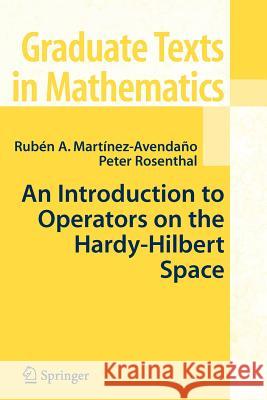An Introduction to Operators on the Hardy-Hilbert Space » książka
An Introduction to Operators on the Hardy-Hilbert Space
ISBN-13: 9781441922533 / Angielski / Miękka / 2010 / 220 str.
The great mathematician G. H. Hardy told us that "Beauty is the ?rst test: there is no permanent place in the world for ugly mathematics" (see 24, p. 85]). It is clear why Hardy loved complex analysis: it is a very beautiful partofclassicalmathematics. ThetheoryofHilbertspacesandofoperatorson themisalmostasclassicalandisperhapsasbeautifulascomplexanalysis. The studyoftheHardy-Hilbertspace(aHilbertspacewhoseelementsareanalytic functions), and of operators on that space, combines these two subjects. The interplay produces a number of extraordinarily elegant results. For example, very elementary concepts from Hilbert space provide simple proofs of the Poisson integral (Theorem 1. 1. 21 below) and Cauchy integral (Theorem 1. 1. 19) formulas. The fundamental theorem about zeros of fu- tions in the Hardy-Hilbert space (Corollary 2. 4. 10) is the central ingredient of a beautiful proof that every continuous function on 0,1] can be uniformly approximated by polynomials with prime exponents (Corollary 2. 5. 3). The Hardy-Hilbert space context is necessary to understand the structure of the invariant subspaces of the unilateral shift (Theorem 2. 2. 12). Conversely, pr- erties of the unilateral shift operator are useful in obtaining results on f- torizations of analytic functions (e. g., Theorem 2. 3. 4) and on other aspects of analytic functions (e. g., Theorem 2. 3. 3). The study of Toeplitz operators on the Hardy-Hilbert space is the most natural way of deriving many of the properties of classical Toeplitz mat- ces (e. g., Theorem 3. 3.











